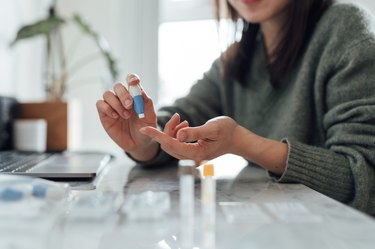
When you're diagnosed with diabetes, many things about your daily routine change. For some people, that includes regularly testing your blood sugar.
Using a blood sugar meter — a small, portable device that comes with a reader and a tool to prick your finger — helps some people with diabetes manage their blood glucose levels and prevent complications.
Video of the Day
Video of the Day
But what if you're nervous to check your blood sugar, or to prick your finger and see blood?
Here, learn how to reduce your blood sugar testing anxiety and how low blood sugar and anxiety are connected.
Why Does Blood Sugar Testing Cause Anxiety?
First things first, it's totally normal to feel anxious testing your blood sugar, especially if you're newly diagnosed with diabetes. Many people feel anxious to know their glucose levels, to prick their finger, to see blood or to test themselves in public.
Bottom line: You are not alone.
"Those newly diagnosed with diabetes may feel overwhelmed and uncertain about having to regularly measure their blood glucose. After all, it's a lot to learn," says Courtney Hubscher, a licensed mental health counselor based in Orlando, Florida.
In fact, a 2014 study in the British Journal of Diabetes and Vascular Disease found that 30 percent of people feel anxiety about testing their own blood sugar, and nearly half of that group avoids testing because of anxiety.
We asked Hubscher and Matthias von Herrath, MD, scientific director of the Diabetes Research Institute, to explain the common fears surrounding blood sugar testing. These include:
1. Fear of Getting an Infection
Nobody likes to get sick, but any time you prick the protective layer of your skin, you increase the risk of exposure to certain infections entering the open skin, or bloodborne viruses like HIV and hepatitis C, per the Centers for Disease Control and Prevention.
That's why doctors recommend you use alcohol wipes on your skin before and after testing, as a regular part of the blood sugar testing process. This can dramatically reduce your risk of infection.
2. Fear of Learning Your Test Results
If you've been dealing with heightened or too-low blood sugar levels, it can be scary to learn what your true numbers are.
Some common causes of high or low blood sugar include the following, per the Mayo Clinic:
- Taking too much insulin or diabetes medication
- Not eating enough
- Eating processed or high-sugar foods
- Postponing or skipping a meal or snack
- Increasing physical activity without adjusting your medication
- Drinking alcohol
"Health anxiety could also be an issue for some people, creating feelings of panic or worry about the results," says Hubscher. "It's important to remember that these feelings are valid and understandable."
3. Fear of Needles
Turns out, there's a term for the fear of needles — trypanophobia.
One in four people are afraid of needles, which might cause them to avoid important things like vaccinations or testing blood sugar, per Harvard Health Publishing.
4. Fear of Testing in Public
For some people, the anxiety of testing their blood sugar in public — especially when newly diagnosed — can feel uncomfortable or anxiety-inducing. You may feel like people are watching, or you may feel judged by others.
Keep in mind that diabetes is a prevalent condition; many other people have to test their blood glucose, too, and often in public settings.
5. Fear of Blood
Sometimes the fear of seeing blood is what makes you anxious about blood sugar testing.
The fear of blood is somewhat common, too, affecting about 4 percent of the population, per the American Heart Association. It is often triggered by seeing blood, and the phobia can even run in families, per Harvard Health Publishing.
Tips to Reduce Blood Sugar Testing Anxiety
No matter the cause of your anxiety around testing your blood sugar, there are ways to reduce it, so blood sugar testing simply becomes another part of your daily routine.
"It's OK to take small steps to make the process easier if it helps you feel more comfortable," Hubscher says.
Here are some tips for reducing blood sugar testing anxiety, as suggested by Hubscher and Dr. von Herrath:
1. Challenge Unhelpful Thinking
Hubscher says you can challenge your irrational thoughts and take steps to restructure them.
First, take a minute to think about how those thoughts are unhelpful, and how they negatively affect your feelings and behavior.
"Through this technique, patients learn how to reframe unhelpful thoughts into more rational ones, and begin developing self-confidence around the testing process," Hubscher says.
2. Learn More About Diabetes Care
Knowledge is power, especially when it comes to your health. That's why it's important to learn about diabetes care (and why you test your blood sugar) once you're diagnosed.
"Understanding your condition can help reduce health-related anxiety," Dr. von Herrath says. "Knowing more about diabetes and why you're testing blood sugar in the first place can provide a sense of empowerment and control for people with diabetes."
3. Change Up Your Testing Tools
There are many different blood sugar monitors on the market with different lancet sizes and depths. If checking your blood sugar feels painful, you may need to make some adjustments.
"If the finger prick is a significant source of anxiety, consider exploring alternative testing methods. Some blood glucose monitors allow testing on alternative sites, like your forearm," Dr. von Herrath says.
"Discuss these options with your doctor to determine what is suitable for you," he adds.
4. Stay Consistent
Another popular phrase? Practice makes perfect. This can apply to testing your blood sugar, too.
Hubscher says checking your blood sugar over time will eventually expose you to the behavior enough that you will get used to it.
With this technique, the only way around the fear is through it. But asking for help from others, particularly mental health experts, can make it easier.
5. Practice Relaxation Techniques
When it's time to check your blood sugar, think about the tension in your muscles and gradually relax them, one by one. Try some slow breathing exercises. Mentally note your stress and anxiety without judgment, as self-judgment can cause more stress.
"Non-judgmental observation of one's own thoughts can be extremely powerful," Hubscher says.
6. Consider Using a Continuous Glucose Monitor
A continuous glucose monitor (or CGM) automatically tracks the level of sugar in your blood. Some models relay that number to you via your mobile phone, per the National Institute of Diabetes and Digestive and Kidney Diseases.
While you'll still need to do finger pricks to calibrate the CGM, and the initial insertion of the CGM sensor may cause anxiety, it will overall reduce the number of times you'll need to prick your finger each day.
CGMs are mostly used for people with type 1 diabetes, but some people with type 2 diabetes do use them. And keep in mind, they are not always covered by insurance.
7. Bring In Moral Support
If you can, ask a loved one to be with you while you test your blood sugar. You may even feel more comfortable having a spouse, parent or friend do your finger prick for you.
While this may not always be available to you, try it if you can and if your loved one is willing, to see if it lowers your anxiety surrounding testing your blood sugar.
8. Set Realistic Expectations
It's nearly impossible to have ideal blood sugar levels at all times, especially when you're first learning how to manage your diabetes.
"Avoid placing excessive pressure on yourself to achieve perfect blood sugar readings every time," Dr. von Herrath says. "Recognize that blood sugar levels can fluctuate due to various factors, and aim for a balance between managing your diabetes effectively while being kind to yourself."
9. Seek Support
If you find your anxiety surrounding blood sugar testing is getting in the way of your health, talk to your doctor, who may be able to suggest support groups for you to join.
Dr. von Herrath says support groups allow you to share your experiences with diabetes, find encouragement and explore resources for financial aid to cover equipment.
"Engaging with a supportive community can help alleviate anxiety and provide practical tips for managing blood sugar testing," he adds.
If anxiety surrounding blood sugar testing persists, consider asking your doctor for a referral to a mental health professional who specializes in anxiety and/or diabetes management.
Can Low Blood Sugar Feel Like Anxiety?
Another factor to keep in mind is that the symptoms of low blood sugar can feel like anxiety, and vice versa. Symptoms that can be common to both conditions include the following, per Dr. von Herrath:
- Sweating
- Feeling shaky
- Fast heartbeat
- Feeling nauseated
- Headache
- Difficulty concentrating
- Irritability
"These overlapping symptoms may cause confusion for some patients who manage both diabetes and anxiety," Dr. von Herrath says.
The biggest difference is that with low blood sugar, or hypoglycemia, you will notice a drop in blood glucose (below 70 mg/dL or similar) through testing, per the Mayo Clinic.
Sometimes, this quick drop can be dangerous, so you'll want to get your numbers up quickly with a high-sugar drink or snack like juice or candy.
Long-term treatment of hypoglycemia, however, will include identifying the cause and adjusting your food intake, medication and exercise accordingly.
If you're having trouble telling low blood sugar and anxiety apart, talk to your doctor, who can help clear things up and help you manage the symptoms of both anxiety and hypoglycemia.
The Bottom Line
It's normal to feel anxious when testing your blood sugar, especially if your diabetes diagnosis is fairly recent.
Sometimes this anxiety will simply go away with time, as you get used to testing your blood sugar. But if it doesn't, consider reaching out for help from a support group or mental health professional.
"Remember, it's OK to have concerns and fears," Dr. von Herrath says. "What's important is to take steps to address these anxieties so they don't interfere with your diabetes management or overall quality of life."
- Diabetes Research Institute Foundation: "Matthias von Herrath, MD"
- Centers for Disease Control and Prevention: "Infection Prevention during Blood Glucose Monitoring and Insulin Administration "
- Mayo Clinic: "Diabetic Hypoglycemia"
- Harvard Health Publishing: "Terrified of Needles? That Can Affect Your Health"
- National Institute of Diabetes and Digestive and Kidney Diseases: "Continuous Glucose Monitors"
- American Heart Association: "Predisposition to Vasovagal Syncope in Subjects With Blood/Injury Phobia"
- British Journal of Diabetes and Vascular Disease: "Anxiety associated with self monitoring of capillary blood glucose"
- Groundwork Counseling: "Courtney, Hubscher, LMHC"
Is this an emergency? If you are experiencing serious medical symptoms, please see the National Library of Medicine’s list of signs you need emergency medical attention or call 911.


